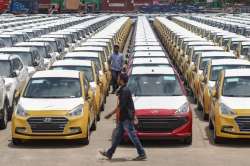Automakers log dip in fleet sales in Sept qtr amid coronavirus pandemic
The fleet segment sales have fallen during the period under review as people were opting for personal mobility options at the cost of shared and public transport in order to maintain distance in the times of the pandemic.

Leading passenger vehicle manufacturers Maruti Suzuki, Hyundai Motor and Toyota Kirloskar Motor have witnessed sharp drop in fleet sales in the July-September period amid the coronavirus pandemic.
The fleet segment sales have fallen during the period under review as people were opting for personal mobility options at the cost of shared and public transport in order to maintain distance in the times of the pandemic.
"There has been extreme aversion on the part of customers against shared mobility and public transport and they are obviously looking at personal transport. If we look at the figures in our portfolio, fleet sales which include shared mobility, in the second quarter there was a drop of 69 per cent," Maruti Suzuki India Executive Director (Sales and Marketing) Shashank Srivastava said.
Taking into consideration the April-September period, the drop in fleet sales is 77 per cent as compared with last year, he added.
"As a result in our portfolio, fleet sales which stood at 7 per cent last year (contribution to total sales) have fallen to 2.4 per cent this year," Srivastava said.
The auto major offers Tour range of variants across hatchback, sedan, van and MPV segments for commercial use in models like Alto, WagonR, Celerio, Eeco, TourS and Ertiga.
Hyundai Motor India, which sells its compact sedan Xcent in the fleet segment, has also seen sales dwindle in the segment post COVID-19.
"The demand has shifted from shared mobility to personal segment so obviously the fleet segment has been impacted. Many financiers are also finding it tough, they are not sure about the future business of this segment so they are also becoming strict so the market for the fleet segment has come down," Hyundai Motor India Director (Sales, Marketing and Service) Tarun Garg said.
There is no impact on the overall sales as the personal segment has more than made for the loss, he added.
"We continue to monitor the situation. It may be a short-term phenomena, the shared mobility segment has done so well in the global markets. It may start doing better here as well in future once the pandemic is over," Garg noted.
The company, however, did not share absolute numbers.
Similarly, Toyota Kirloskar Motor (TKM) said it has also seen institutional sales of Innova Crysta drop during the second quarter.
"The fleet segment is very badly hit. It has literally come to a standstill. People are just not willing to sit in taxis and shared cars. It is a very challenging scenario. There is a dip of 15-20 per cent in the taxi segment alone as compared with the year-ago period," TKM Senior Vice President (Sales and Service) Naveen Soni said.
The institutional sales of Innova Crysta, which include taxi, corporate and government sales altogether, have gone down by 65.72 per cent to 1,386 units in the July-September quarter this year as compared with 4,044 units in
the year-ago period, the company said.
According to data updated by the union health ministry on Saturday, India's COVID-19 caseload has mounted to 84,62,080.